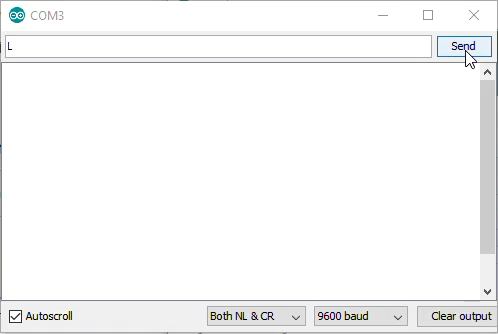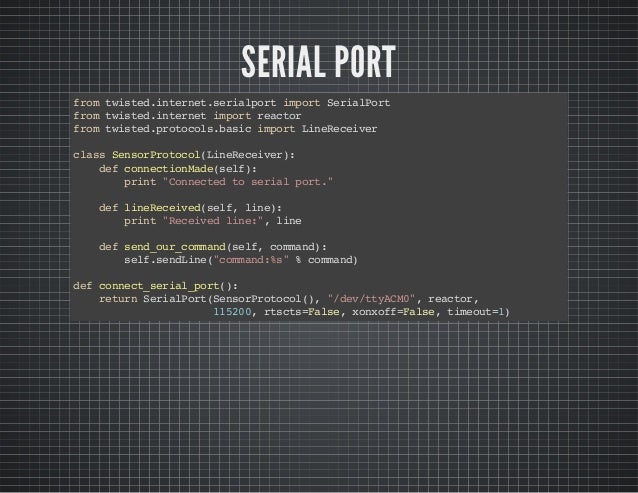- A key parameter in the pyserial Serial class is the timeout parameter. This parameter is defined as: timeout=None, #set a timeout value, None for waiting forever. The Serial class read function also accepts a size parameter that indicates how many characters should be read. Below is the source for the read function on Posix systems (Linux, etc).
- To read single byte from serial device. Data = ser.read to read given number of bytes from the serial device. Data = ser.read(size=5) to read one line from serial device. Data = ser.readline to read the data from serial device while something is being written over it. #for python2.7 data = ser.read(ser.inWaiting) #for python3 ser.read(ser.
- The following are 13 code examples for showing how to use System.TimeoutException.These examples are extracted from open source projects. You can vote up the ones you like or vote down the ones you don't like, and go to the original project or source file by following the links above each example.
Bases: object
Instantiate a Serial object and open the tty device at the specifiedpath with the specified baudrate, and the defaults of 8 data bits, noparity, 1 stop bit, no software flow control (xonxoff), and no hardwareflow control (rtscts).
| Parameters: |
|
|---|---|
| Returns: | Serial object. |
| Return type: | |
| Raises: |
|
Python Serial.getTimeout - 1 examples found. These are the top rated real world Python examples of serial.Serial.getTimeout extracted from open source projects. You can rate examples to help us improve the quality of examples.
read(length, timeout=None)[source]¶Read up to length number of bytes from the serial port with anoptional timeout.
timeout can be positive for a blocking read with a timeout inseconds, zero for a non-blocking read, or negative or None for ablocking read that will block until length number of bytes are read.Default is a blocking read.
For a non-blocking or timeout-bound read, read() may return less thanthe requested number of bytes.
For a blocking read with the VMIN setting configured, read() willblock until at least VMIN bytes are read. For a blocking read with bothVMIN and VTIME settings configured, read() will block until at leastVMIN bytes are read or the VTIME interbyte timeout expires after thelast byte read. In either case, read() may return less than therequested number of bytes.
| Parameters: |
|
|---|---|
| Returns: | data read. |
| Return type: | bytes |
| Raises: |
|
write(data)[source]¶Write data to the serial port and return the number of byteswritten.
| Parameters: | data (bytes, bytearray, list) – a byte array or list of 8-bit integers to write. |
|---|---|
| Returns: | number of bytes written. |
| Return type: | int |
| Raises: |
|
poll(timeout=None)[source]¶Poll for data available for reading from the serial port with anoptional timeout.
timeout can be positive for a timeout in seconds, zero for anon-blocking poll, or negative or None for a blocking poll. Default isa blocking poll.
| Parameters: | timeout (int, float, None) – timeout duration in seconds. |
|---|---|
| Returns: | True if data is available for reading from the serial port, False if not. |
| Return type: | bool |
flush()[source]¶Flush the write buffer of the serial port, blocking until all bytesare written.
| Raises: | SerialError – if an I/O or OS error occurs. |
|---|
input_waiting()[source]¶
Query the number of bytes waiting to be read from the serial port.
| Returns: | number of bytes waiting to be read. |
|---|---|
| Return type: | int |
| Raises: | SerialError – if an I/O or OS error occurs. |
output_waiting()[source]¶Query the number of bytes waiting to be written to the serial port.
| Returns: | number of bytes waiting to be written. |
|---|---|
| Return type: | int |
| Raises: | SerialError – if an I/O or OS error occurs. |
close()[source]¶Close the tty device.
| Raises: | SerialError – if an I/O or OS error occurs. |
|---|
fd¶Get the file descriptor of the underlying tty device.
| Type: | int |
|---|
devpath¶Get the device path of the underlying tty device.
| Type: | str |
|---|
baudrate¶Get or set the baudrate.
| Raises: |
|
|---|---|
| Type: | int |
databits¶Get or set the data bits. Can be 5, 6, 7, 8.
| Raises: |
|
|---|---|
| Type: | int |
Python Serial Read Time Out Example Pdf
parity¶Get or set the parity. Can be “none”, “even”, “odd”.
| Raises: |
|
|---|---|
| Type: | str |
Python Serial Read Time Out Examples
stopbits¶Get or set the stop bits. Can be 1 or 2.
| Raises: |
|
|---|---|
| Type: | int |
xonxoff¶Get or set software flow control.
| Raises: |
|
|---|---|
| Type: | bool |
rtscts¶Get or set hardware flow control.
| Raises: |
|
|---|---|
| Type: | bool |
vmin¶Get or set the VMIN termios setting for minimum number of bytes returnedfrom a blocking read. Can be between 0 and 255.
When configured in conjunction with VTIME, VTIME acts as an interbytetimeout that restarts on every byte received, and a blocking read willblock until at least VMIN bytes are read or the VTIME timeout expires afterthe last byte read. See the termios man page for more information.
| Raises: |
|
|---|---|
| Type: | int |
vtime¶Get or set the VTIME termios setting for timeout in seconds of ablocking read. Can be between 0 to 25.5 seconds, with a resolution of 0.1seconds.
When configured in conjunction with VMIN, VTIME acts as an interbytetimeout that restarts on every byte received, and a blocking read willblock until at least VMIN bytes are read or the VTIME timeout expires afterthe last byte read. See the termios man page for more information.
| Raises: |
|
|---|---|
| Type: | float |
Bases: object
Instantiate a Serial object and open the tty device at the specifiedpath with the specified baudrate, and the defaults of 8 data bits, noparity, 1 stop bit, no software flow control (xonxoff), and no hardwareflow control (rtscts).
| Parameters: |
|
|---|---|
| Returns: | Serial object. |
| Return type: | |
| Raises: |
|
read(length, timeout=None)[source]¶Read up to length number of bytes from the serial port with anoptional timeout.
timeout can be positive for a timeout in seconds, 0 for anon-blocking read, or negative or None for a blocking read that willblock until length number of bytes are read. Default is a blockingread.
For a non-blocking or timeout-bound read, read() may return data whoselength is less than or equal to the requested length.
| Parameters: |
|
|---|---|
| Returns: | data read. |
| Return type: | bytes |
| Raises: |
|
write(data)[source]¶Write data to the serial port and return the number of byteswritten.
| Parameters: | data (bytes, bytearray, list) – a byte array or list of 8-bit integers to write. |
|---|---|
| Returns: | number of bytes written. |
| Return type: | int |
| Raises: |
|
Python Read Serial Port
poll(timeout=None)[source]¶Poll for data available for reading from the serial port.
timeout can be positive for a timeout in seconds, 0 for anon-blocking poll, or negative or None for a blocking poll. Default isa blocking poll.
| Parameters: | timeout (int, float, None) – timeout duration in seconds. |
|---|---|
| Returns: | True if data is available for reading from the serial port, False if not. |
| Return type: | bool |
flush()[source]¶Flush the write buffer of the serial port, blocking until all bytesare written.
| Raises: | SerialError – if an I/O or OS error occurs. |
|---|
input_waiting()[source]¶Query the number of bytes waiting to be read from the serial port.

| Returns: | number of bytes waiting to be read. |
|---|---|
| Return type: | int |
| Raises: | SerialError – if an I/O or OS error occurs. |
Python Pyserial Read Example
output_waiting()[source]¶Query the number of bytes waiting to be written to the serial port.
| Returns: | number of bytes waiting to be written. |
|---|---|
| Return type: | int |
| Raises: | SerialError – if an I/O or OS error occurs. |

close()[source]¶Close the tty device.
| Raises: | SerialError – if an I/O or OS error occurs. |
|---|
fd¶Get the file descriptor of the underlying tty device.
| Type: | int |
|---|
devpath¶Get the device path of the underlying tty device.
| Type: | str |
|---|
baudrate¶Get or set the baudrate.
| Raises: |
|
|---|---|
| Type: | int |
databits¶Get or set the data bits. Can be 5, 6, 7, 8.
| Raises: |
|
|---|---|
| Type: | int |
parity¶Get or set the parity. Can be “none”, “even”, “odd”.
| Raises: |
|
|---|---|
| Type: | str |
stopbits¶Python Serial Read Time Out Example Sentences
Get or set the stop bits. Can be 1 or 2.

| Raises: |
|
|---|---|
| Type: | int |
xonxoff¶Get or set software flow control.
| Raises: |
|
|---|---|
| Type: | bool |
rtscts¶Get or set hardware flow control.
| Raises: |
|
|---|---|
| Type: | bool |